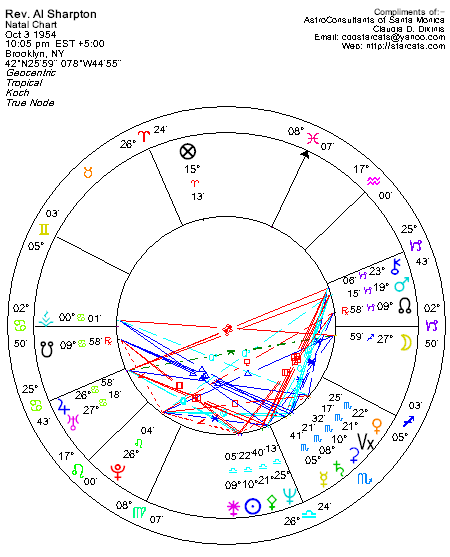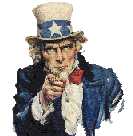Election 2004
Democratic Party
Rev. Al Sharpton
New York



Debbi Kempton-Smith quotes him, as he recalls his birth certificate gave something between 10:00 and 10:10 p.m. Data courtesy of Bill Herbst, writing for the Feb-Mar issue of The Mountain Astrologer.
ANNOUNCED CANDIDATE: The controversial Rev. Al Sharpton is going to stand out as one of the more flamboyant 2004 candidates. While he stands no real chance of winning the nomination, look for him to grab attention with his publicity-seeking tactics.
An avowed liberal, Sharpton despises the centrist wing of the party that -- he believes -- has undermined its traditional support for the poor and minorities. "I am running to take out the DLC, which I call the Democratic Leisure Class, because that's who it serves -- the leisure class and the wealthy," he explained. Sharpton's strength has been traditionally underestimated in his past primary campaigns for New York City Mayor (losing by a surprisingly close 40% to 32% vote in 1997) and US Senator. In recent years, Bill Bradley pursued his endorsement in 2000 and some of the NYC Mayoral hopefuls openly courted his backing in 2001. According to Time magazine, Sharpton sees the 2004 campaign as an opportunity for him to displace Rev. Jesse Jackson and "take on the mantle of black leadership in America." Sharpton's 2004 run for President is directly taken from Jackson's history (Jackson ran in 1984 and 1988). A flamboyant former provocateur, Sharpton first grabbed national headlines in the 1980s by defending alleged racist attack victim Tawanna Brawley (an incident later proven to be hoax). Today, Sharpton heads a civil rights organization entitled the National Action Network. He filed paperwork for his Presidential exploratory committee in January 2003. Sharpton started the race with a lot of enemies, including whites who perceive him as an anti-white racist, police officers whom he criticized repeated over the years, and the Jewish community (Sharpton has been blamed for rhetoric that incited street crowds in the early 1990s in two black-versus-Jewish community incidents in NYC that both ultimately escalated into bloodshed, riots and deaths). Sharpton worked in recent years to tone down his rhetoric, better his relationship with the Jewish community, and expand his coalition to include Hispanics (by getting involved on issues like Vieques. A spokesperson for the National Jewish Democratic Coalition said in 2000: "Al Sharpton is not David Duke, he is not Louis Farrakhan, there are plenty of things Sharpton has said that are not pretty, but that doesn't mean we never can speak with him." The 2002 HBO airing of an old FBI tape of Sharpton purportedly agreeing to participate in money laundering for illegal, Mafia-connected cocaine deals caused Sharpton further political grief. Sharpton said the tape was part of an FBI conspiracy to set him up, that he denies all the allegations (and was only "play-acting" on the tape to get out of the meeting) ... and he's also now suing HBO for $1 billion for airing the tape. Sharpton came out with his campaign book -- Al on America -- in fall 2002, and has been extensively promoting it. Sharpton likes to say he is the "only Democrat in the race who opposes the death penalty." Sharpton filed paperwork showing he raised just $114,000 as of the close of the March 31, 2003 federal reporting period -- the second lowest amount of any of the "major" Democratic candidates. Sharpton initially hinted in March 2003 that he would consider running as an Independent if he is unable to win the Democratic nomination in the primaries. In June 2003, he shot down that possibility: "If I was interested in running as a third-party candidate, I would have done that from the beginning ... I hope to support the nominee, I hope to be the nominee, but I will not be running as a third party," he said on CNN.
Sharpton Bio Notes courtesy of politics1.com
|






